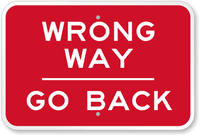 |
| Discovered the RMS Titanic? Yeah, that Knorr. |
I intentionally put distance between myself and my usual life. I turned off notifications on my phone and checked when I thought about it instead of letting my phone vibrate and interrupt. I stopped responding to email because I discovered everything could wait. I didn't obsess over how the cats were handling the new feeding routine. I separated myself from some of my poorer habits and got away from juggling work, family, hobbies, and the day-to-day crap we all deal with, at least for a few days.
I made space in my head for new things and allowed myself to choose what I put there. I keep forgetting I have that power all the time, not just on vacation.
Hitting Walls
Our minds shape our realities. Sometimes we get stuck thinking that This Is The One True Path and that there's no other way. There's always another way, we just need perspective to find the subtle fork in whatever path we walk.
 |
| A clear sign of trouble ahead? We should be so lucky. |
For example, in one project I'm working on I've helped develop ideas to add gaming hooks over the past few weeks. Unfortunately, those ideas ran so far afield from the original project that it turned into an entirely different project which ultimately needed to be shelved so we could get back to the original project. In this case walking away morphed into generating ideas for a different but related project.
Sometimes walking away is as simple as playing a game on my cell phone. Sometimes I physically take a walk. Sometimes I wash dishes and lose myself in the repetition of scrubbing, rinsing, drying, and stacking. Sometimes I switch to a different project. Sometimes I go to bed.
What do I do when I hit my wall? Usually I do at least one of the following:
- Breathe. More oxygen in your brain will help with anything you do. Breathing is the only thing you need to do in this one instant, so you may as well do it intentionally right now.
- Have a drink. I stick with water to keep my brain gears lubricated, but if you subscribe to the "Write drunk. Edit sober," idea, have at it.
- Change scale. Usually I'm stuck on a very specific detail. Looking at a wider picture reminds me that it's not that big a deal, which takes the pressure off. This helps me focus on the overall project (read more in Focus Your Intent).
- Take a break. Do something else for 10 minutes and let your mind work in a different mode. Something you see in Angry Birds or Kingdom Rush may trigger a new idea.
- Eat something. Hunger rarely helps my thought process. Then again, Thanksgiving Torpor torpedoes my productivity. Find balance. Also remember that Skittles and Sour Patch Kids give a massive sugar hangover.
- Go out to eat. Take care of both 4 and 5 at once. Talking with someone else over sushi helps me. Note to self: do this more.
- Sleep. Lack of sleep usually makes me think I have fewer options than I actually have. This one is tricky given my work schedule, but I tend to write productively on the train between 7 and 8 AM.
 |
| Pressing through walls. Boring. |
I still struggle when editing my own work. I remember what I was like to write whatever I'm reading and I get stuck in the writing mode. I like getting feedback from someone else - it gives me a new perspective on the project and keeps me from getting stuck in my own head too much.
When I need to edit my own writing, I treat it like I'm playing an RPG. "Now I'm playing an editor. What would an editor think about this sentence here?" Sometimes it actually works.
Letting Minds Work
 The mind is a powerful thing. Sometimes you can ask it what to do and it'll answer immediately with a great idea. Sometimes it needs to chew on the problem for a while. Sometimes you'll wake up at 3 AM with the perfect idea for finishing that story that you got from a dream. You already use tricks to let you mind solve problems more effectively, whether you realize it or not. Figure out what they are and experiment with making them more effective and more intentional. Writing is a habit. Get your mind trained to write and you'll go far.
The mind is a powerful thing. Sometimes you can ask it what to do and it'll answer immediately with a great idea. Sometimes it needs to chew on the problem for a while. Sometimes you'll wake up at 3 AM with the perfect idea for finishing that story that you got from a dream. You already use tricks to let you mind solve problems more effectively, whether you realize it or not. Figure out what they are and experiment with making them more effective and more intentional. Writing is a habit. Get your mind trained to write and you'll go far.Give your mind the space to work and it'll serve you well. Push too hard and you'll end up hating the project. Keep pushing too hard and you'll hate writing.
Now get out there and give yourself a break, whatever that means to you.
Thanks for reading!

No comments:
Post a Comment